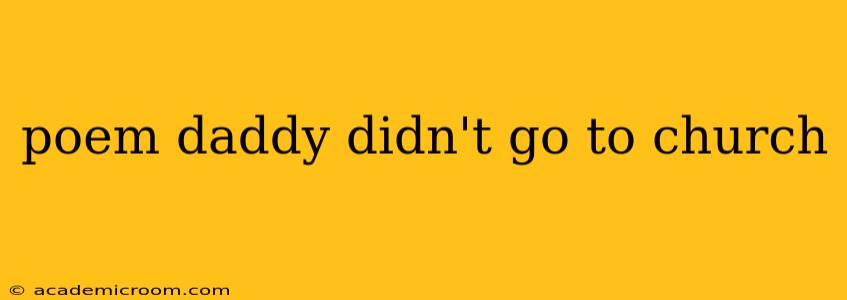Poem: Daddy Didn't Go to Church – Exploring Themes of Faith, Family, and Rebellion
The poem "Daddy Didn't Go to Church" (assuming this is the title; if there's another title, please provide it) opens up a fascinating exploration of faith, family dynamics, and individual rebellion against societal norms. While the specific poem isn't provided, we can analyze the potential themes and interpretations based on the title alone, and explore related questions a reader might have.
H2: What are the potential themes of a poem titled "Daddy Didn't Go to Church"?
The title itself suggests a deviation from the expected. In many communities, church attendance is a significant aspect of family life. A father's absence from church could symbolize several things:
-
Rebellion against religious authority: The father might be questioning or rejecting the established religious doctrines or practices. This could stem from personal experiences, intellectual disagreements, or a broader societal critique of organized religion.
-
Family conflict and differing beliefs: The poem might explore a tension between the father's beliefs (or lack thereof) and the mother's or children's faith. This could lead to internal family struggles and questions of identity.
-
Secular values and priorities: The father might prioritize other aspects of life – work, personal pursuits, or even a different spiritual path – over traditional church attendance. This could highlight a conflict between secular and religious values within the family.
-
Trauma or disillusionment: Past negative experiences with the church or religious figures could explain the father's absence. The poem might explore the complexities of faith in the face of trauma or betrayal.
-
A different kind of spirituality: The father may find spiritual fulfillment outside of the traditional church setting, perhaps through nature, personal reflection, or community involvement. This could challenge the reader's perception of spirituality.
H2: How might the poem explore the relationship between the father and his children?
The father's absence from church could deeply affect his relationship with his children. The poem might delve into:
-
The children's perspective: How do the children perceive their father's actions? Do they feel ashamed, confused, or liberated by his nonconformity? Do they adopt similar beliefs or maintain a different faith?
-
The father's perspective: What are the father's motivations for not attending church? Does he feel guilt, defiance, or peace in his decision? Does he actively explain his beliefs or simply maintain silence?
-
The mother's role: How does the mother navigate the differing beliefs within the family? Does she mediate, support her husband, or maintain her own religious practices? Her role could be critical in shaping the children's understanding of faith.
H2: What kind of imagery and symbolism might be used in the poem?
The poem could employ powerful imagery to convey the themes discussed above. This might include:
-
Religious symbolism: Contrasting images of the church building, religious rituals, and the father's alternative activities could create a powerful juxtaposition.
-
Nature imagery: The absence of the church might be mirrored by the presence of natural settings, representing a different kind of spiritual connection.
-
Family imagery: The use of familial objects, shared meals, or specific family rituals could depict the dynamics of faith within the home.
H2: Could the poem be interpreted as a commentary on societal expectations?
Yes, absolutely. The poem might serve as a broader commentary on the societal pressures surrounding religious conformity and the challenges of living authentically in the face of these expectations. It could highlight the individual's right to choose their own path, regardless of societal norms.
By exploring these potential themes and interpretations, we can gain a deeper understanding of the depth and complexity that a poem with the title "Daddy Didn't Go to Church" might encompass. The power of the poem would lie in its ability to portray these complex dynamics with emotional honesty and artistic skill.
